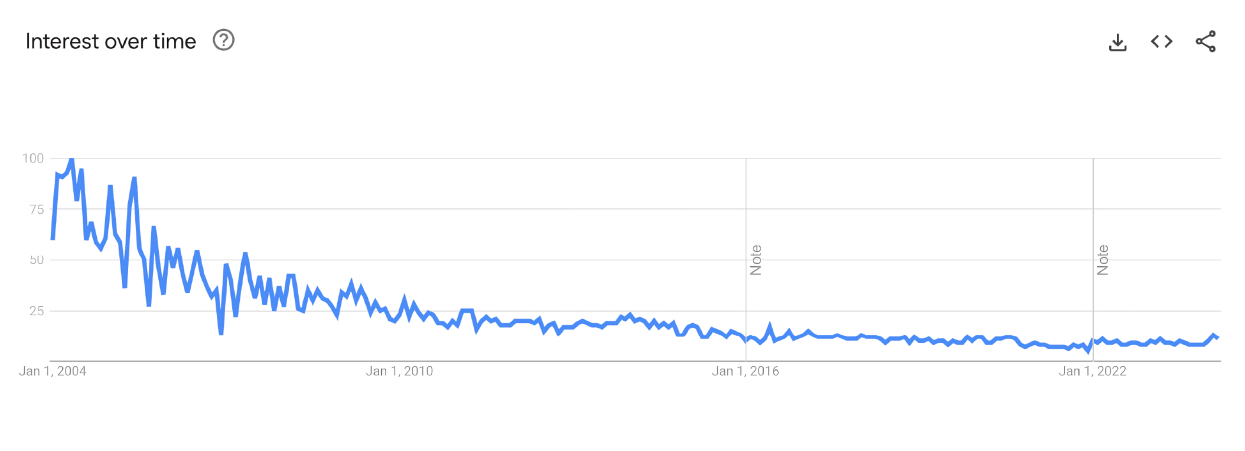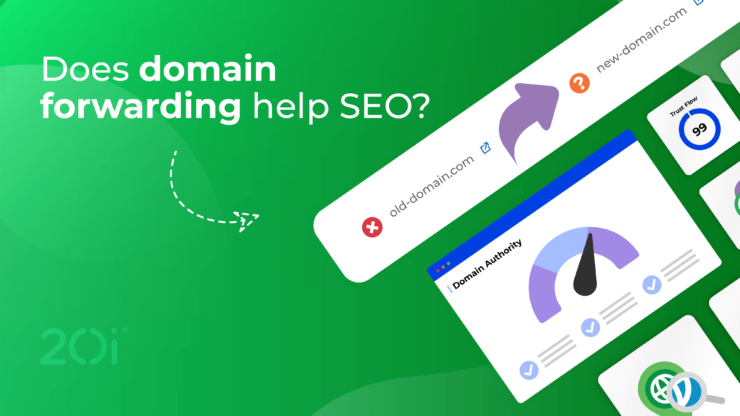Domain forwarding was once a popular tactic in the early days of SEO to quickly boost sites’ rankings.
Usage of domain forwarding in SEO has fallen significantly over the years, but does it still work and should you do it?

What is domain forwarding?
Domain forwarding is the process of buying a pre-existing and established domain name to then forward it to your own website.
Typically, domains purchased for this purpose have two key attributes:
- They are expired
- They previously held strong SEO characteristics (PageRank, domain authority, Trust flow etc.)
How did domain forwarding help SEO?
The theory behind the approach is that forwarding an authoritative, expired domain to your website provides a boost to its rankings due to the strong reputation held by the expired domain.
People using domain forwarding for this purpose preferred expired domains with high numbers of links pointing to them.
When the domain is redirected to your website, the link equity is passed along, contributing to your website’s authority in the eyes of search engines.
What Google says…
Officially speaking, domain forwarding does not help SEO in 2024 – at least as far as ranking on Google is concerned.
In an AMA session in September 2023, Gary Illyes – a search analyst at Google – said:
“If a domain expires, and somebody buys that domain, any signals the site had accumulated will not be transferred to the new domain owner. Google knows when a domain expires.”
In the 2024 Spam Update, Google defined the principles of domain forwarding as meeting their definition of spam in a manner that strongly discourages website owners from engaging in the practice:
“Expired domain abuse is where an expired domain name is purchased and repurposed primarily to manipulate search rankings by hosting content that provides little to no value to users.”
Several examples of expired domain abuse were included in their documentation, one of which was the buying of an expired domain that had previously used by a school that is then forwarded to a website that serves gambling content.
While the purpose in their example is to entice users to gamble, as opposed to purely for SEO purposes, Google is not taking kindly to those who try to earn quick wins from buying up other domains.
As anyone who has worked in digital marketing will know: what Google says doesn’t always equate to what Google does. Are there still benefits to be enjoyed utilising domain forwarding for SEO?
What SEO experts say…
We reached out to the SEO community to get some insight from SEO experts and professionals who have tried domain forwarding recently. Here is what they had to say:
The Results Were Lackluster
Dylan Andrade, an SEO specialist at Swim SEO told us that from his experience with domain forwarding, “the results were lackluster”.
“I’ve actually tried forwarding links from one of our clients’ old domains to their new domains, and despite solid domain authority, the results were quite lackluster. I wouldn’t recommend buying and forwarding expired SEO domains for any Whitehat SEO projects.”
Manual Action Penalty
Advertising specialist Dave Kerr of Merged Dental Marketing went even further, saying domain forwarding had an acutely negative effect on his websites.
“I tested this with a client site a few years back as an experiment. We purchased two expired domains that had solid backlink profiles and redirected them to the site. There was a slight bump in some keyword rankings at first, but within 2-3 months the site was hit with a manual action penalty. We had to do considerable cleanup to get back in Google’s good graces.”
Despite the issues that Dylan and Dave were met with, we found the consensus on domain forwarding to be far from unanimous with some SEO’s claiming to observe positive effects:
Definitely still works!
George Bates, SEO manager at digital agency Limelight Digital says that great SEO results from domain forwarding are still possible, but it isn’t quite as easy as it used to be.
“As with many popular SEO tactics that get spammed, Google will advise against it and downplay its value to try to stop it. But, from experience, this definitely still works! It’s just no longer as simple as forwarding hundreds of low quality, irrelevant domains to your site and expecting a rankings boost.”
The execution must be correct
Co-founder and director of Click Intelligence, James Owen, was also cautiously optimistic about the effects, but clarified that it all depends how the domain is chosen.
“When executed thoughtfully, domain forwarding can boost SEO. Ensure the site aligns with your niche and the backlinks that site has would be valuable pointing to your site. An audit is crucial beforehand, and the execution must also be correct.”
Final thoughts
The effectiveness of domain forwarding as part of a SEO strategy is not an entirely settled issue.
Some experts claim some benefit can be gleaned from the technique when used cautiously and ethically.
A strong use case is if your company acquires or merges with another business. Forwarding the domain of the other company to your own provides moderate SEO benefits and passes relevant traffic to the right location.
Google’s official stance is that the practice no longer meaningfully works for SEO purposes. As such, we would recommend not pursuing domain forwarding as a major SEO tactic.
Scouring the web for “high authority” expired domains to snap up and quickly 301 is a practice best left in the past and, should things take a negative turn, you will waste time, money and even damaged the reputation of your website.
Would you still forward domains specifically for SEO in 2024? Or is it not worth the risk for your operations? Let us know your thoughts and experiences in the comments below.
Interested in learning more about SEO? Check out the SEO tools, blogs & podcasts we love.








Gary Illyes stresses the importance of adhering to Google’s guidelines for website ranking, which prioritize factors such as high-quality content, relevance, and authority. This framework is often referred to as EEAT, standing for Experience, Expertise, Authority, and Trust. In the past, people used to manipulate search engine rankings by purchasing expired domains and redirecting them to their websites. However, this tactic has become less effective due to Google’s implementation of various algorithms aimed at assessing content relevancy and usefulness.
Nevertheless, there are still scenarios where leveraging an expired domain could yield benefits. If the expired domain possesses high relevance, quality backlinks, and a strong reputation, it may still hold value.
On the other side, if a reputable brand or business transitions to a new domain, Google may recognize the significance of the expired domain’s links and authority. In such cases, Google may consider the historical relevance and authority of the expired domain, potentially benefiting the new website’s SEO performance. That’s one reason why redirecting expired domains can’t be ignored.
Not for me these days. Old hat trick.
Google got very wise to this and thankfully it isn’t a practical tactic anymore.